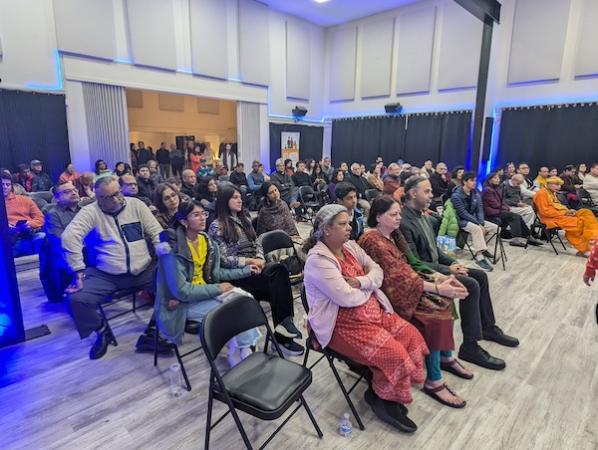COHNA, the Coalition of Hindus in North America sponsored the Echoes of Kashmir at the Academy of Creative Arts in Burlington MA, on January 19, 2025. It was an evocative and heart-rending tribute to the Kashmiri Hindu Genocide, bringing to life the stories of loss, survival, and resilience of a community forced into exile. Attended by a diverse audience, including community leaders, academics, activists, and artists, the event skillfully blended art, history, and personal narratives to illuminate the tragedy that befell the Kashmiri Pandits in the late 20th century.
Following an introduction to COHNA by Rajeshwari Godbole, a young Kashmiri girl, Arnie, presented a Devi Vandana in Kashmiri. Following this, Sunayana Kachroo presented a beautiful audio visual presentation of the history of Kashmir. It was amazing to see how many things had their origins in Kashmir. This included the first University, the Sharada Peet that predates Takashashila and Nalanda. Grammarian Panini, Patanjali who gave the world Yoga Sutras, Bharata who gave the world the Natya Shastra and so many others came from Kashmir.
The land has survived tremendous attacks from invaders. However it is also the home of King Lalitaditya, who established a very powerful empire that spread far and wide. Sanjay Kaul, one of the survivors of the genocide and a key member of the Kashmiri Overseas Association, described the 7 genocides that have again and again decimated the community.
A key highlight of the event was a powerful presentation by Lalit Koul, Dr. Omanand Koul and Sanjay Kaul that chronicled the events leading up to the genocide. Through survivor testimonies, and expert commentary, the panelists presented a vivid picture of the terror that gripped the valley in the late 1980s and early 1990s—nightmares of slogans echoing in the streets, targeted killings, and the mass exodus of an entire community.
Their insights highlighted not just the historical and political context of the genocide but also the ongoing struggles faced by the displaced community. Panelists emphasized the need for preserving the cultural heritage of the Kashmiri Pandits and called for greater awareness and acknowledgment of their plight on both national and global platforms.
Personal storytelling formed the emotional core of the event. Survivors took to the stage to recount their experiences—of leaving behind homes and memories, of living in makeshift refugee camps, and of clinging to their identity in the face of immense adversity. Their stories were raw and unfiltered, offering the audience a window into the human cost of the tragedy.
Echoes of Kashmir was more than an event; it was a powerful reminder of the importance of remembrance and the need to amplify voices that have long been silenced. It succeeded in fostering empathy and understanding while underscoring the urgency of addressing the pain of the past to build a more just future. Unfortunately the disinformation spread in the media adds insult to injury by questioning if the genocide was real.
As attendees left the venue, many expressed a deep sense of connection and responsibility to share what they had learned. The event not only honored the memories of those who suffered but also served as a call to action for justice, reconciliation, and the preservation of a rich cultural heritage that continues to endure against all odds.



